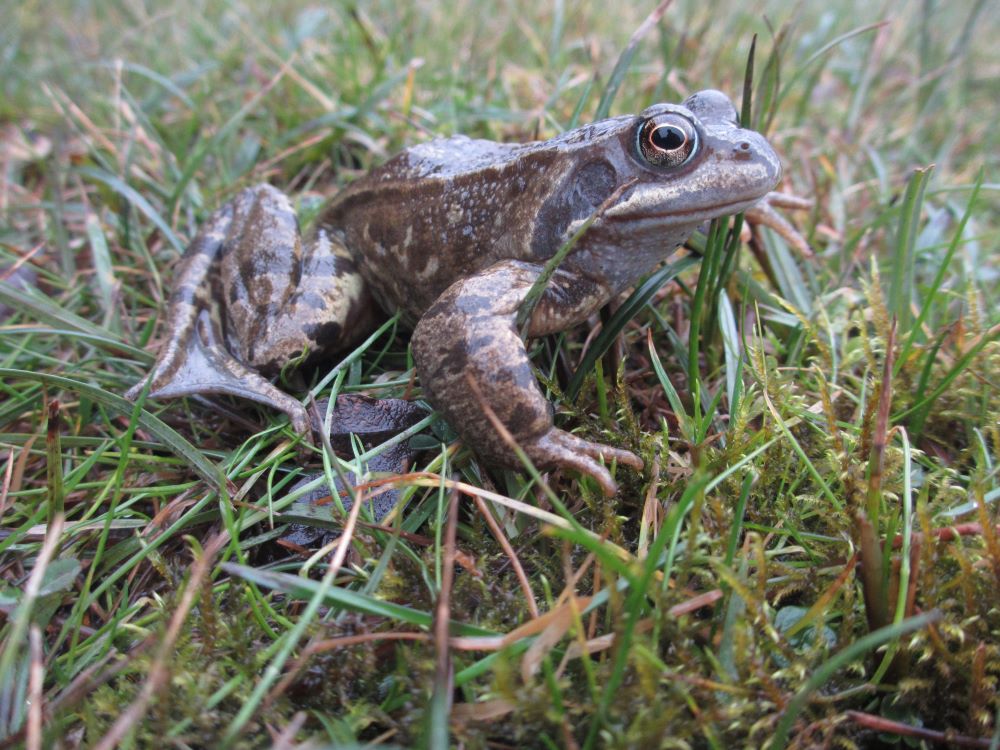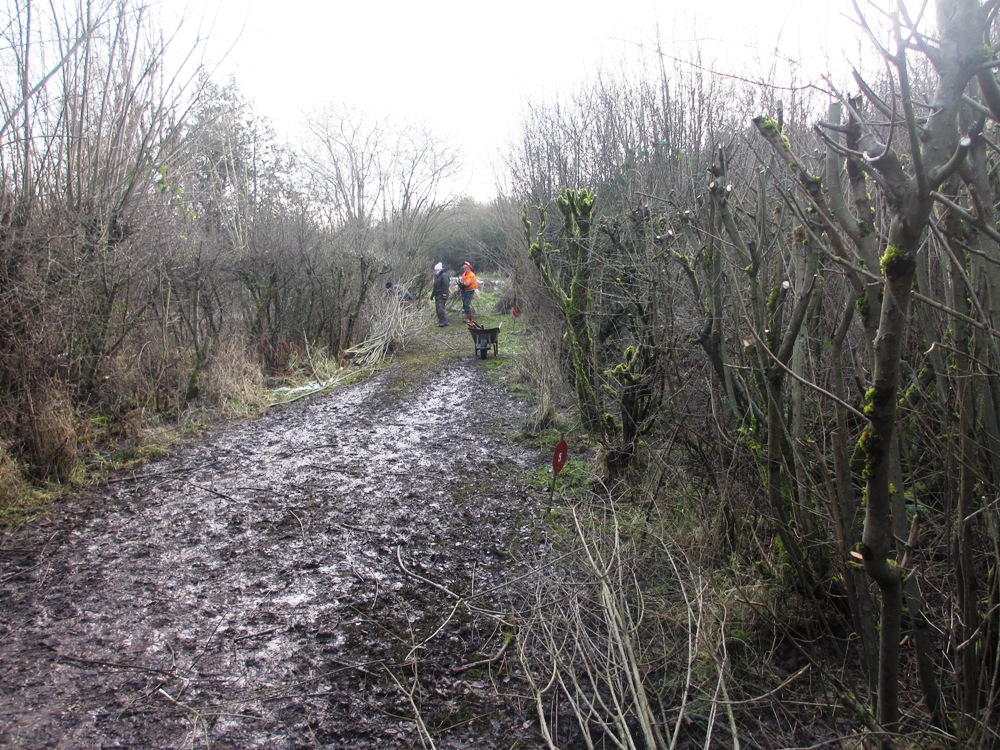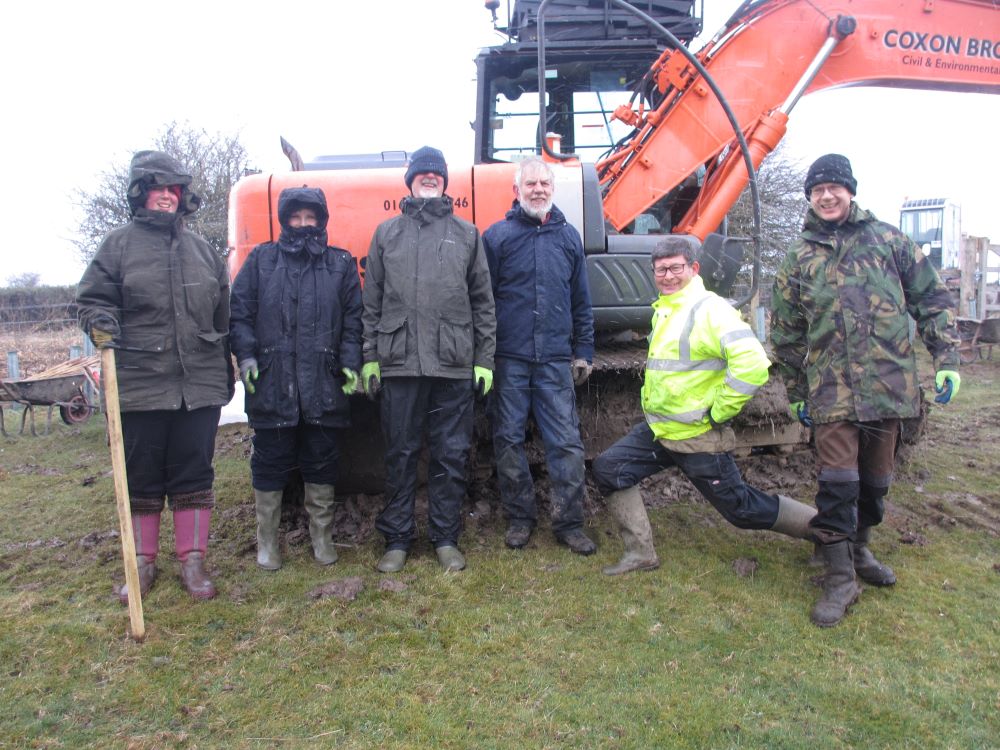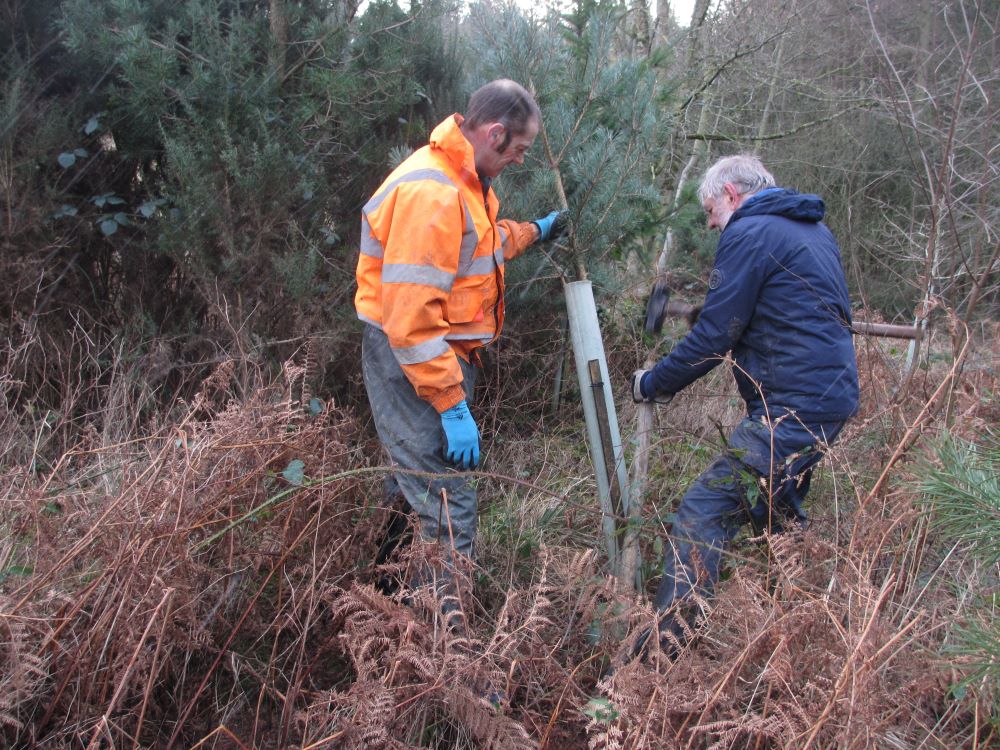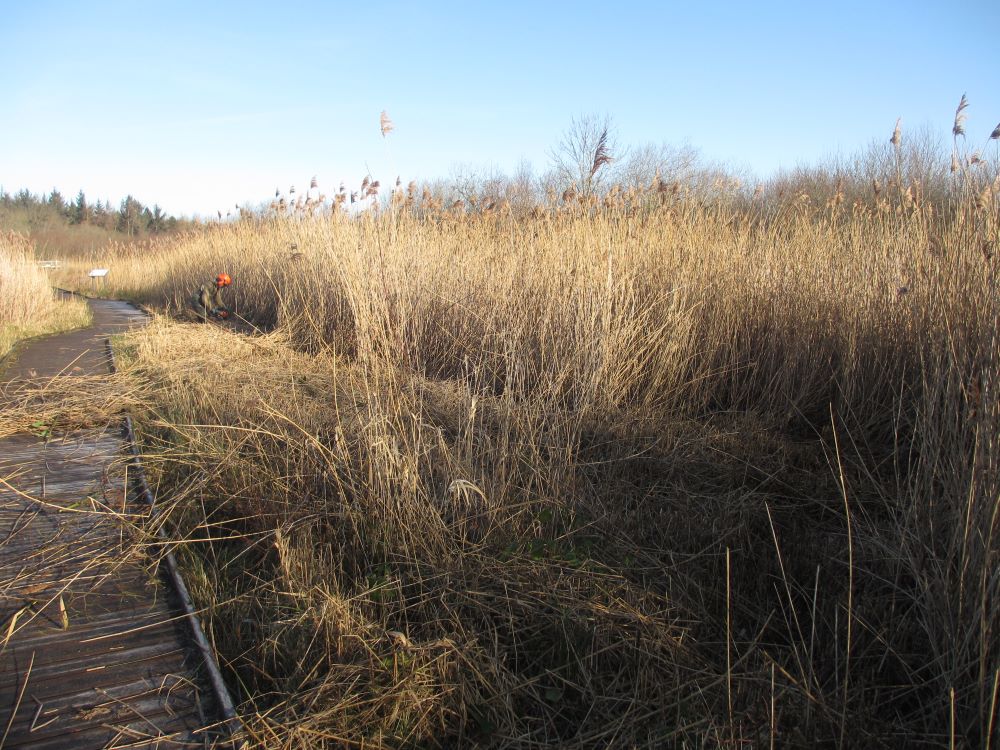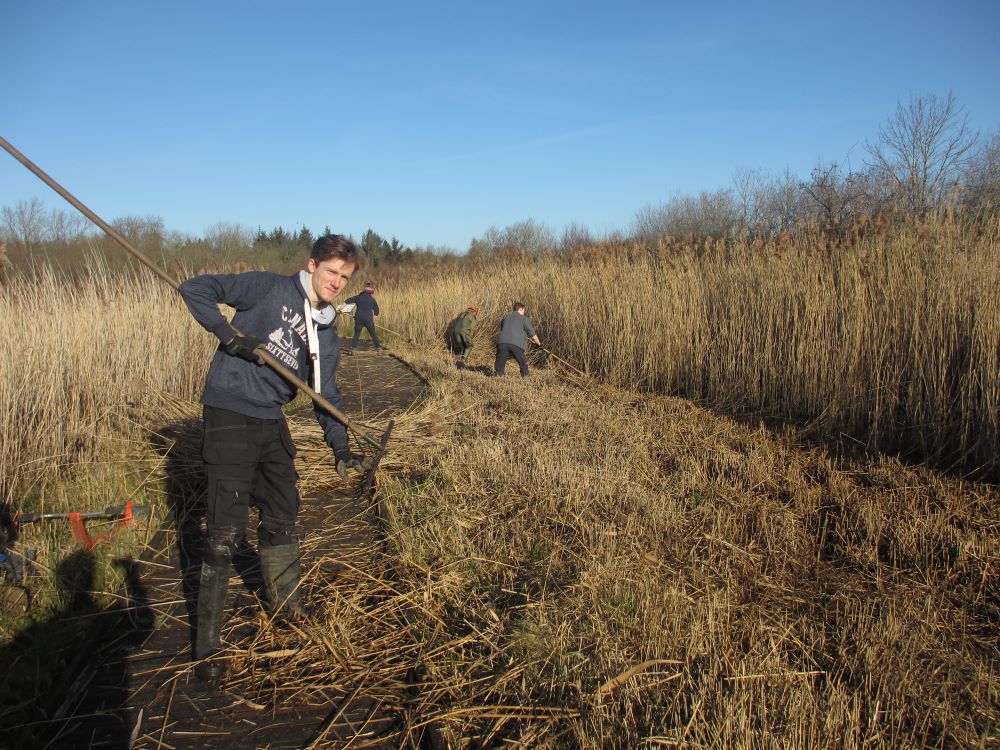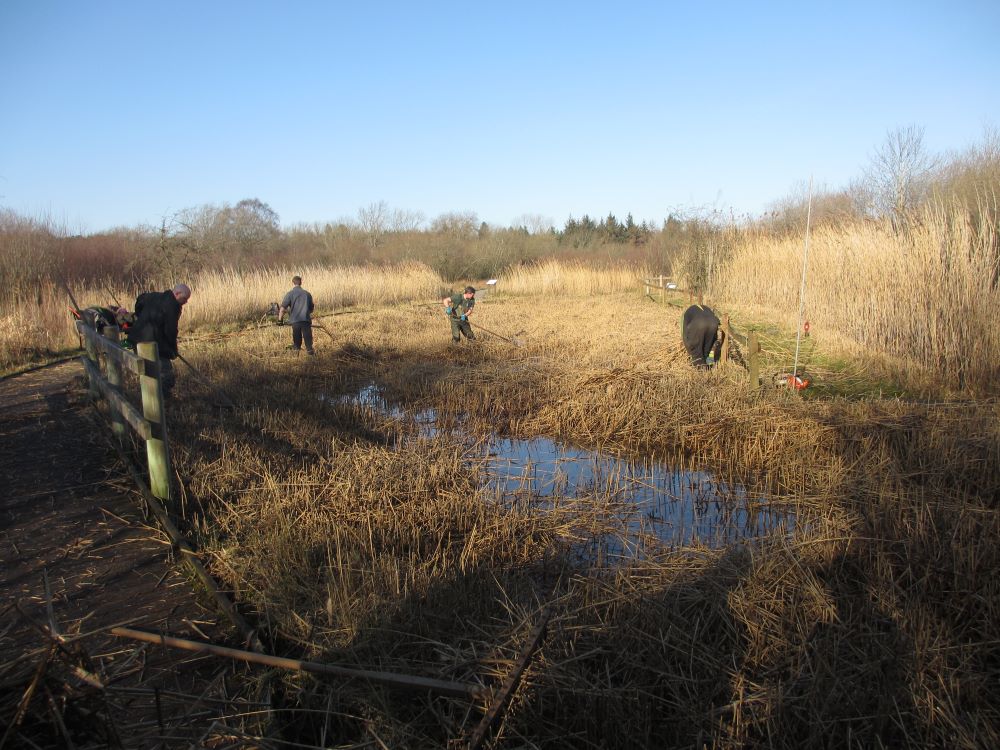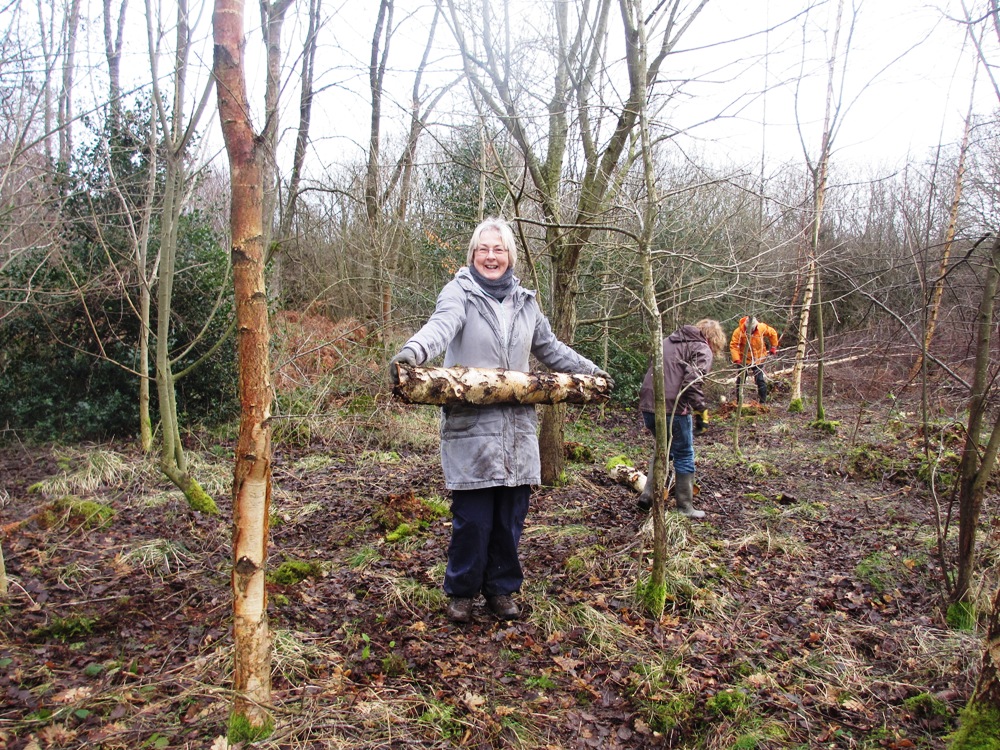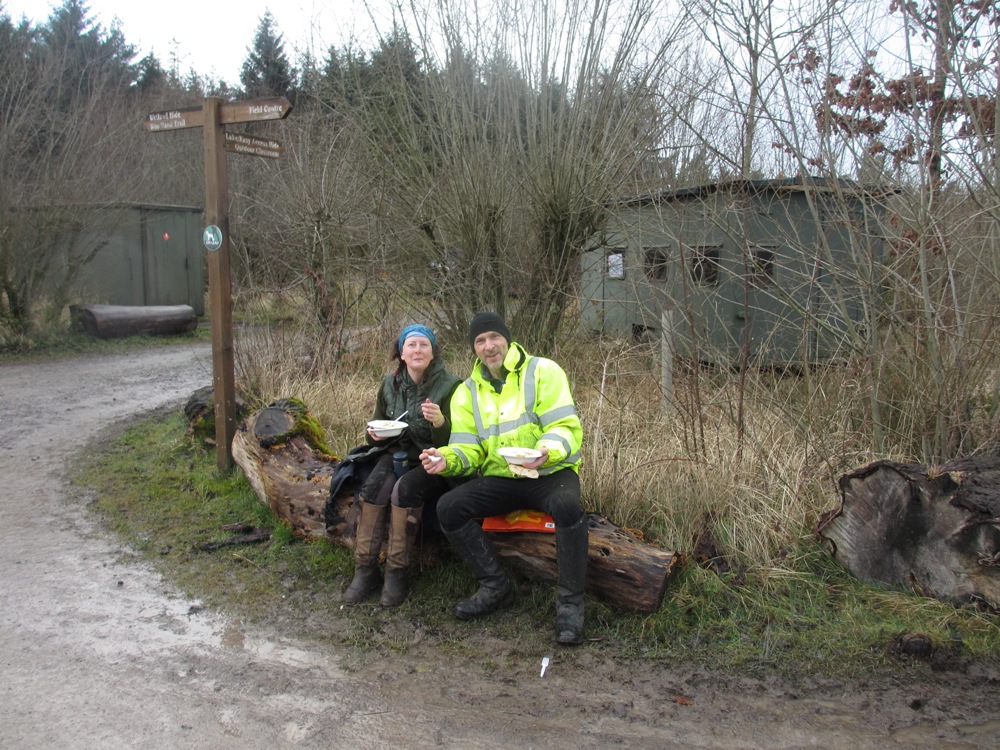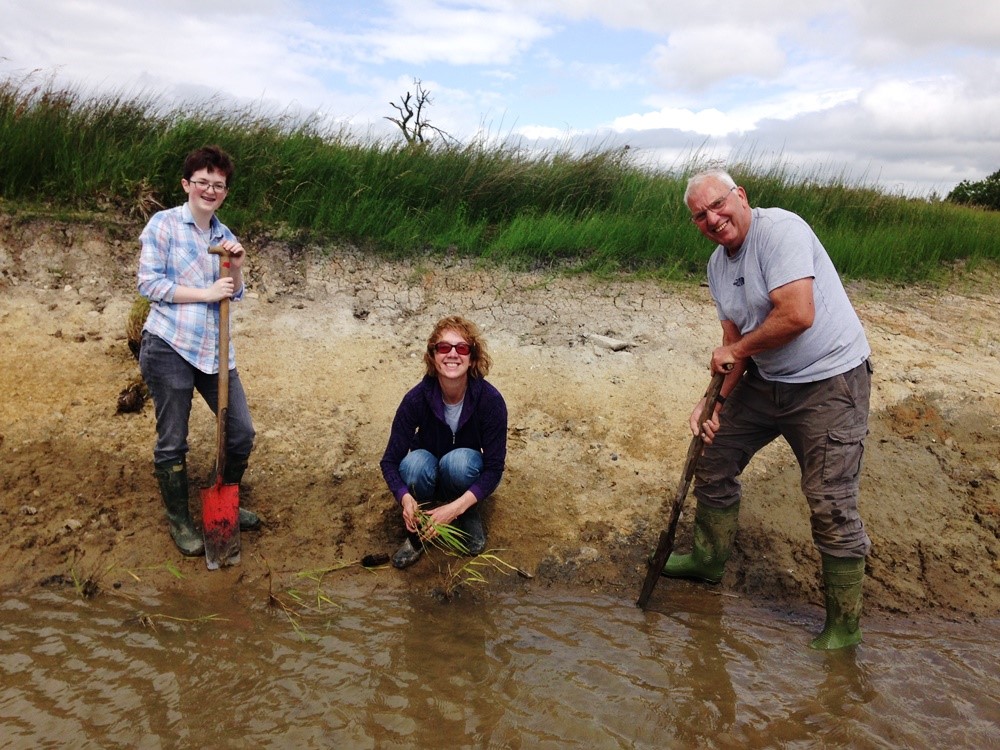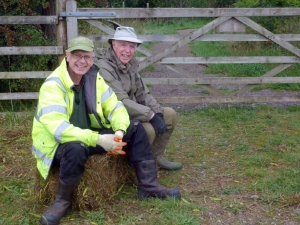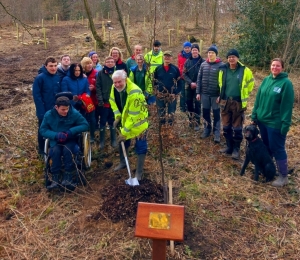Blog Archive (16) Posts Made in February 2020
A Leap Year Walk
Saturday, February 29th 2020
The guided walk set off for Risedale Beck when a shout stopped us and we all hurried back to see what had been found.

When we looked closely it was a beautiful frog, the second to be sighted recently.
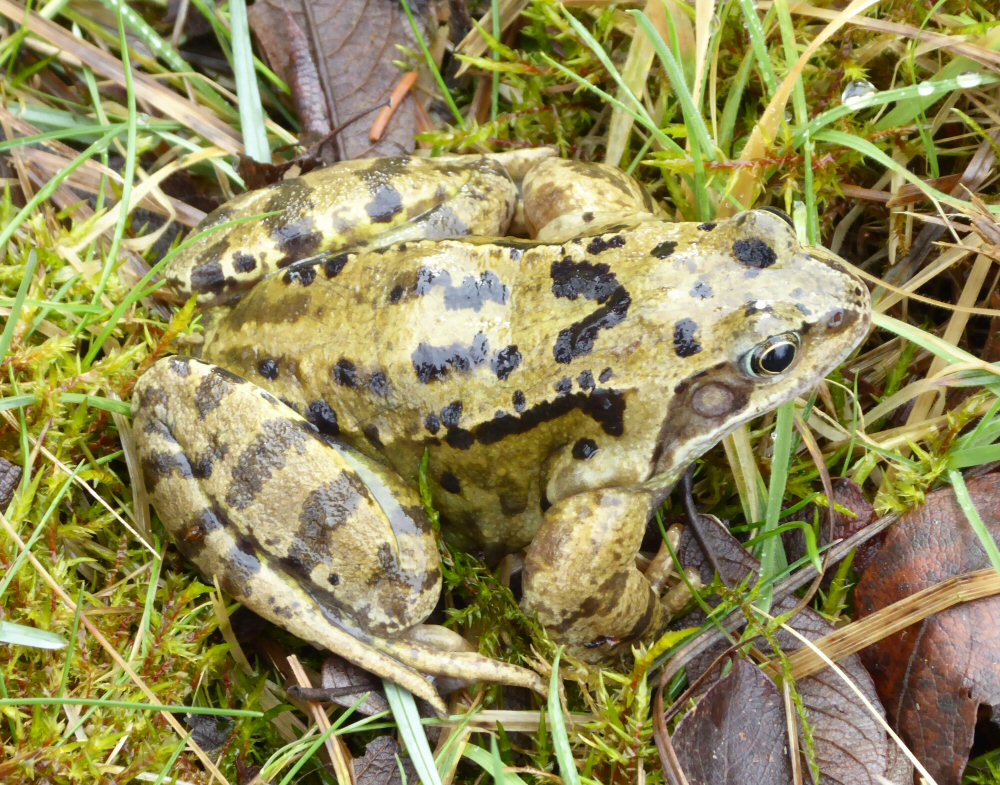
As we headed back to the Field Centre a movement, followed by some bubbles was spotted, in the pond where the Bogbean grows. We tried to say that this was a Frog but others in the group said that it wasn't a 'proper' sighting! Further through the Scrapes, in the pond where the reeds have been cut there were definitely Frogs! (By the afternoon, when the wind had increased and the temperature had dropped not a one was to be seen.) If there are warm, sunny spells over the next few days listen for the frogs croaking and look for the first frogspawn.
In between frog-spotting we looked at Hazel trees with their green buds and catkins.
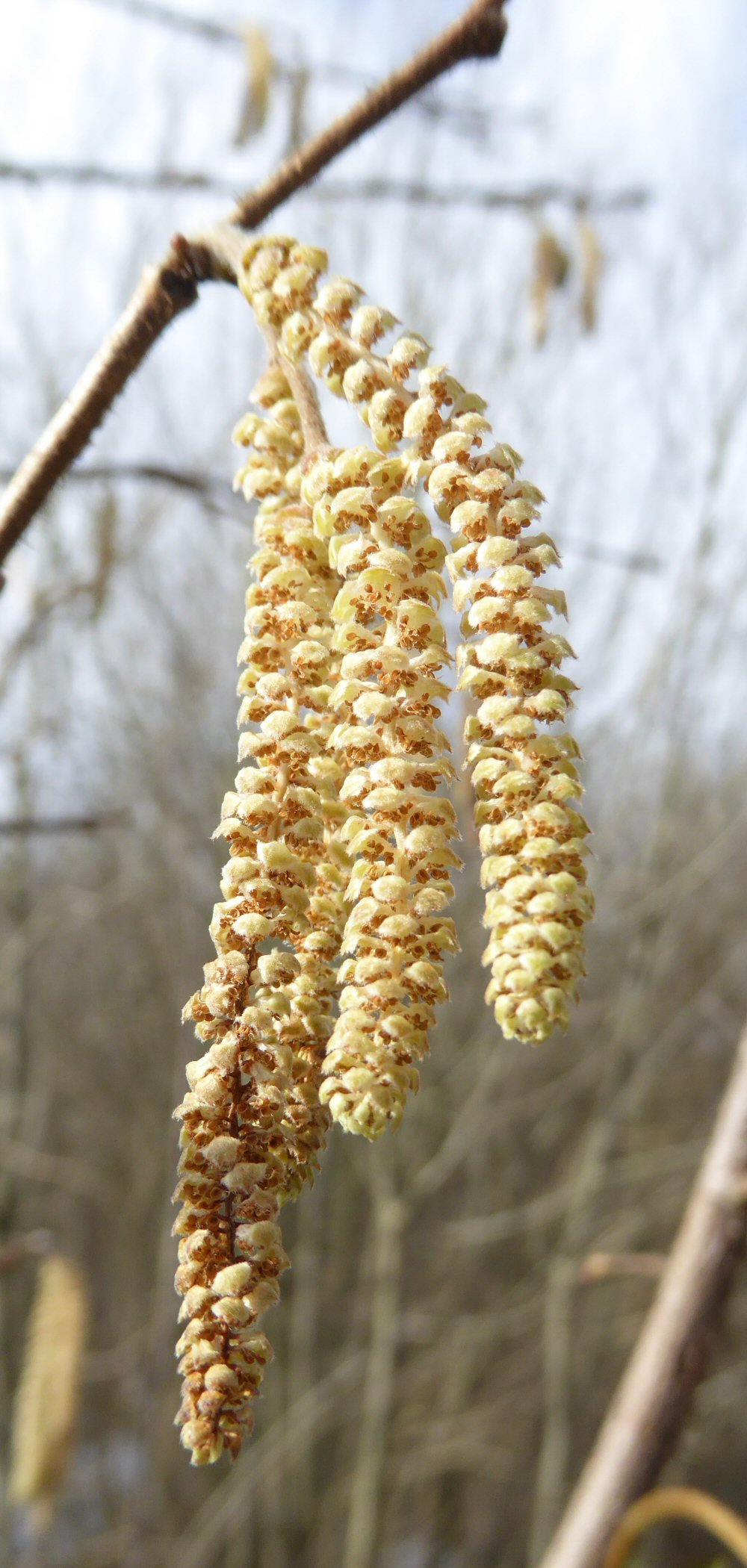
The female flowers were also present.

Back in the Field Centre the group watched Brambling feeding with the Chaffinches, on the ground. Redpol and Siskin were enjoying the Nyger seeds. A Blackbird was trying really hard to reach the nuts in the nut feeder and almost succeeding! The Great Spotted Woodpecker had no difficulty.
Always Something To Do
Thursday, February 27th 2020
Blue sky makes you think of warmer days, but it certainly was not warm this morning. In a few months time this view will be totally changed as the trees burst their buds and the vegetation grows.

The start of the day saw the volunteers hard at work - with breakfast!

Once breakfast was over it down to the 'proper' work. Water leaves the lake over the weir and flows into the stream, which is a flight path used by Kingfishers. Good growing seasons over the last couple of summers has seen the trees and undergrowth almost block out the stream. The area was given a good cut

and soon looked much better. Hopefully the Kingfishers can find their way to the lake and give a great deal of pleasure to volunteers and visitors.
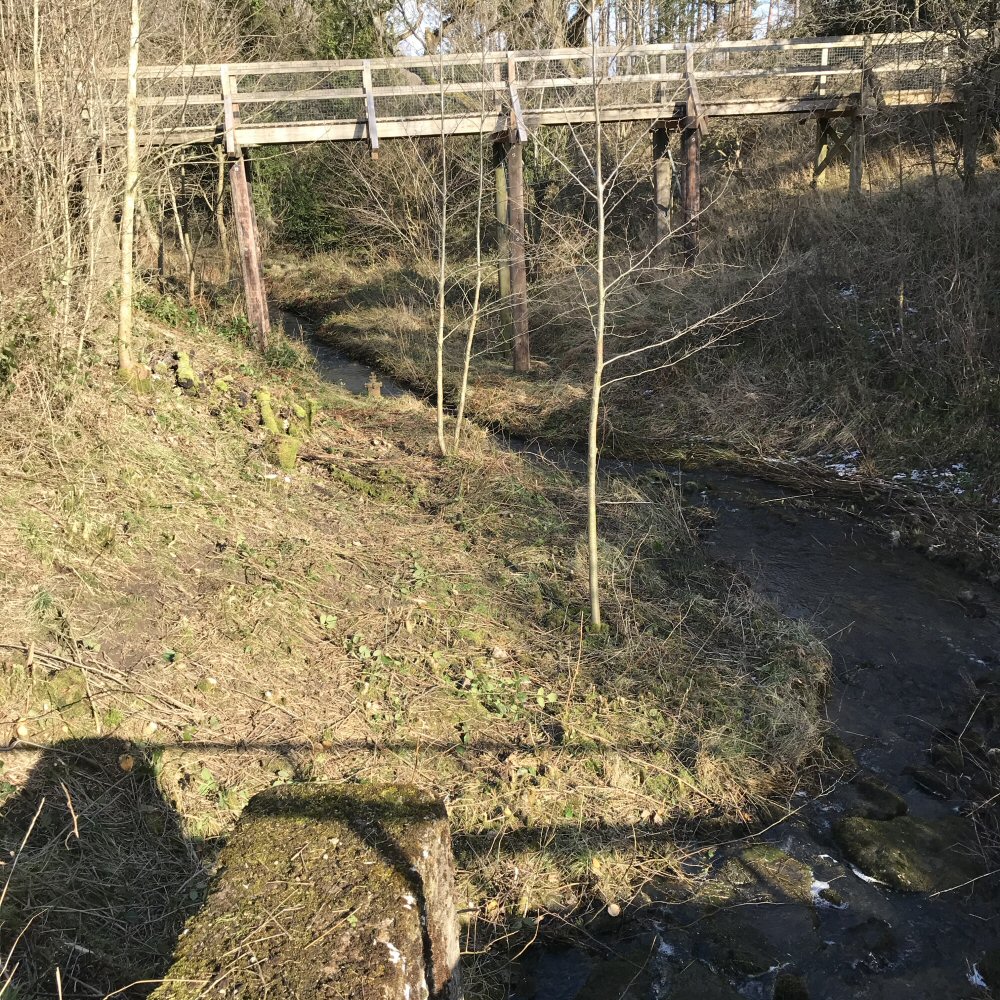
Spigot Mere was the next task. Wind had blown much vegetation around the overflow from the Mere and this needed clearing. Waders donned, Peter and Gerry set about the task. Cold water on a cold day, but it does have a certain beauty about it.

Once the vegetation was cleared, the outflow could flow easily again.

At the end of the day (the days are getting longer) there was still light to enjoy the outdoors.

Thanks to all the volunteers for their work today.
A Lovely Day
Wednesday, February 26th 2020
In places around the reserve we were sheltered from the biting wind and the sun was warm. The head of the lake was calm, whilst closer to the hide there were small waves.

Spigot Mere was a different kettle of fish as there were almost 'white horses' on the waves, crashing against the bund.

Later in the day the wind had dropped a little and the Mere looked calmer.

Most of the snow that fell on Monday had melted but as you turned some corners a white carpet was laid out in front of you. As the saying goes snow left in the hedgebacks means more to come. Could this be classed as a hedgeback?

It was the end of the month flower walk and as well as recording the flowers 'in flower' we continued with our tree ID. Those pesky conifers are not easy!
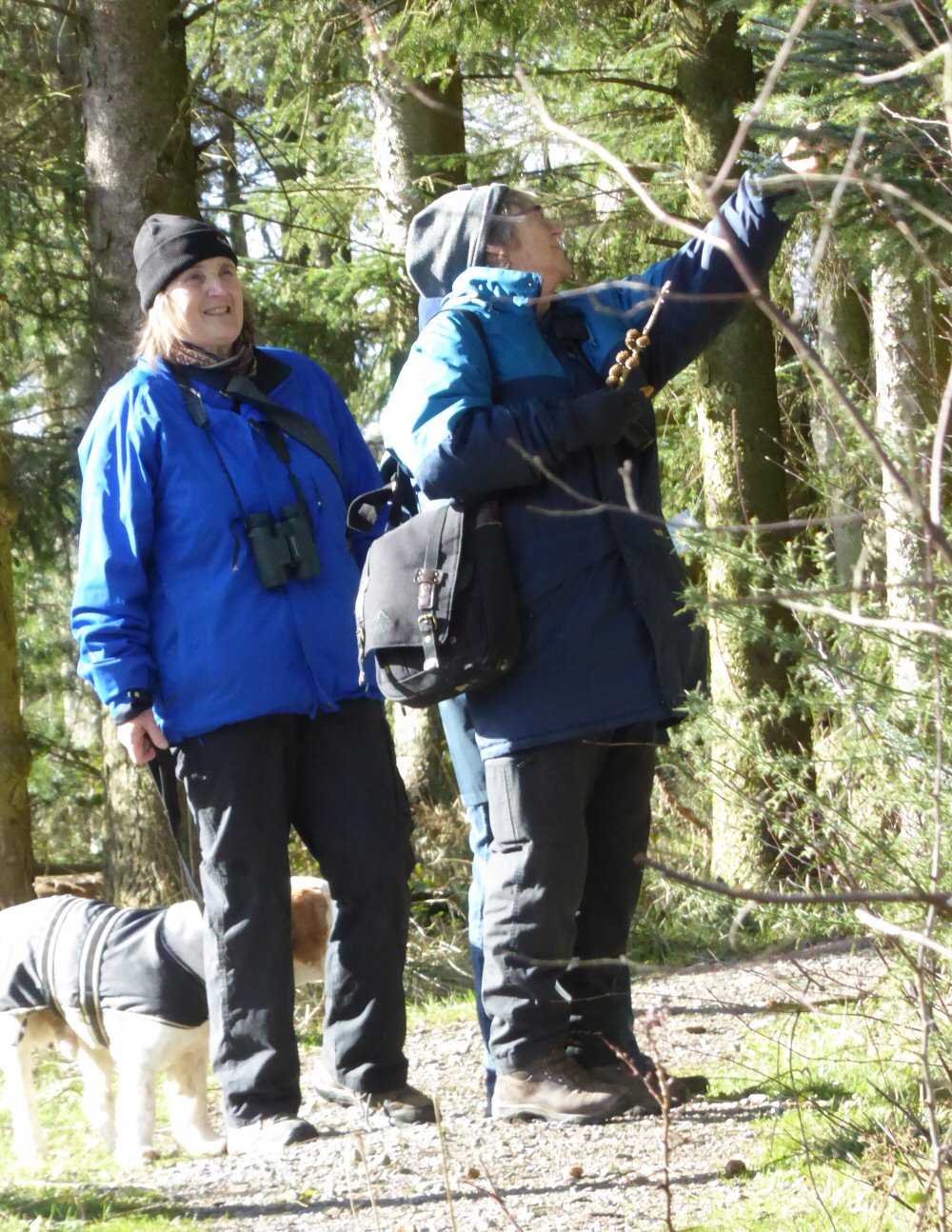
We can recognise Larch and it was showing its female flowers.
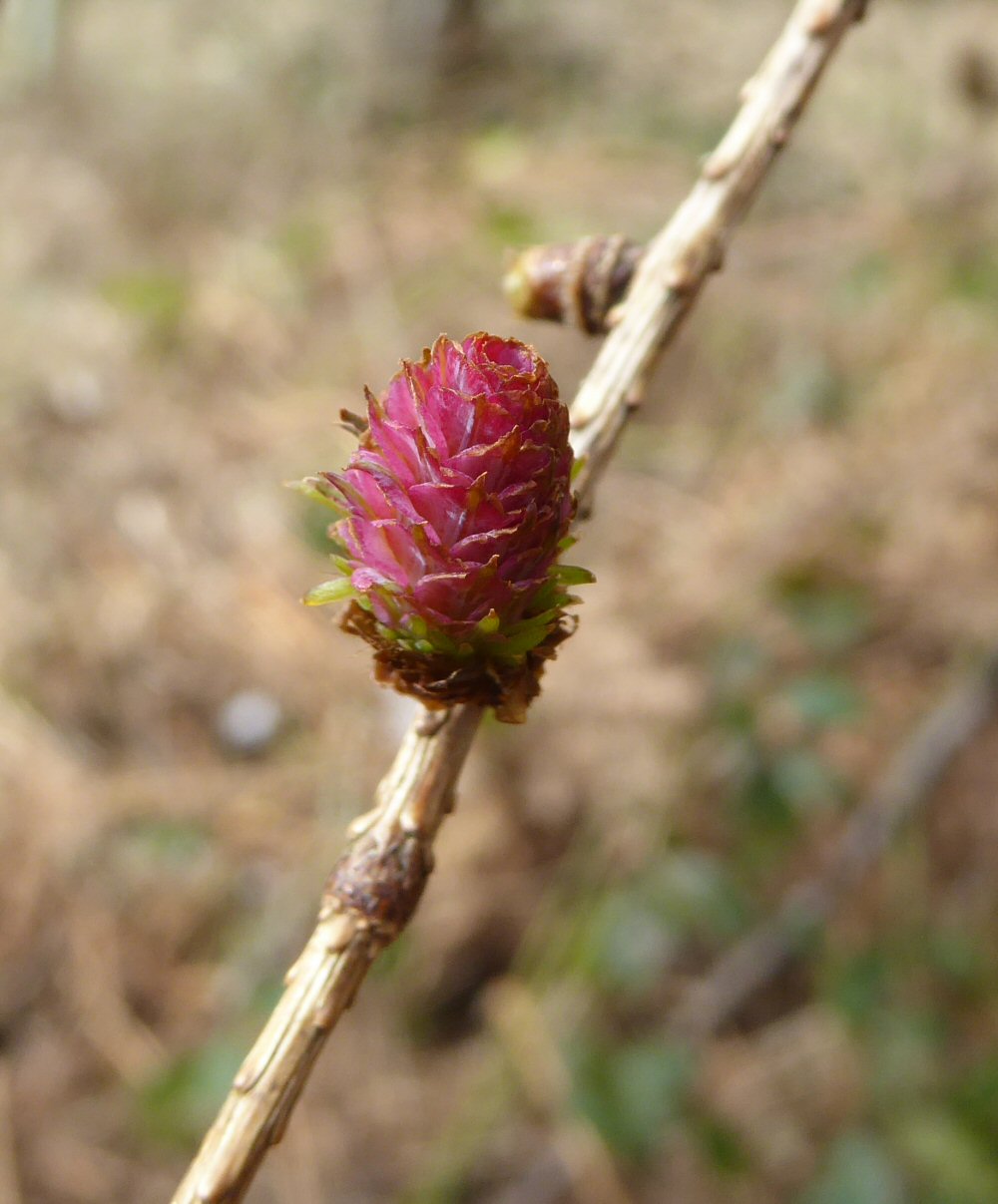
But more sursprisingly several Larch had burst their buds and new soft green needles were easily seen.

Out on the moor a Goat Willow was noticed as its buds had also burst. It was counted in the flower list although these stamens had not yet matured, some were seen on the large Willow next to the perimeter fence near the gate.
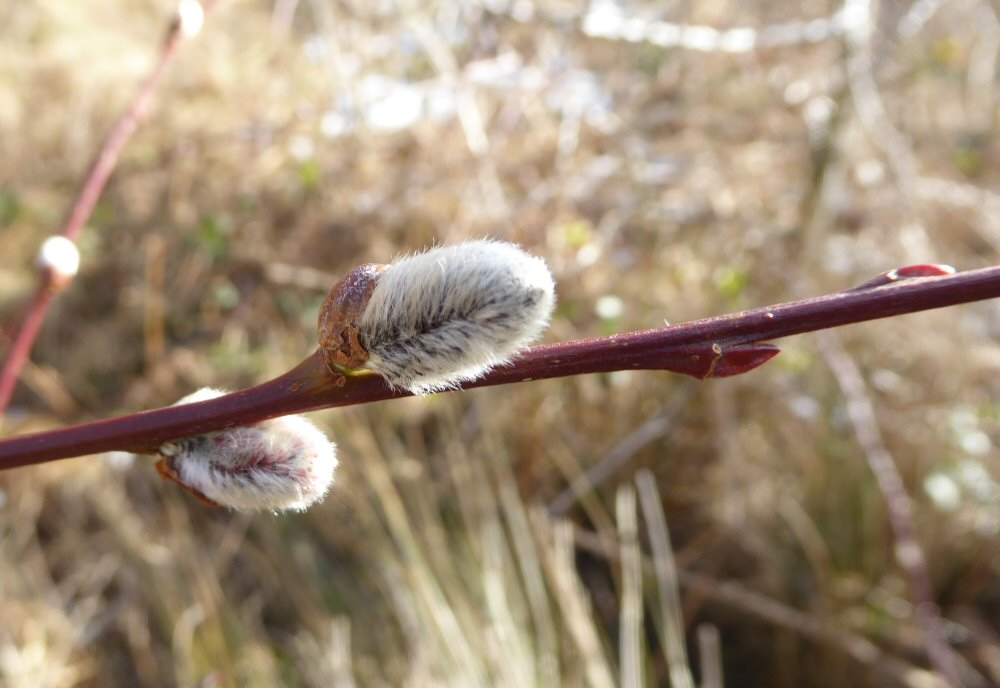
At the end of the walk eight flowers had been recorded. Thank you to all the volunteers who helped. It was commented upon that next month we would need pen and paper to record all the flowers - at least we hope we will.
After the Storms
Tuesday, February 25th 2020
The main jobs for the volunteers today was to clear up the damage caused by the storms.
A conifer had fallen over the Wildfowl Platform path so it needed to be moved as soon as possible.

Hard work soon saw the path cleared and no damage done to the platform or boardwalk.

Next on the list was another conifer, on the felled area along Risedale Beck. Ian used his chainsaw to good effect.

All the branches were removed just leaving the bare trunk across the hillside.

A fire was set to clear the brash of another conifer.
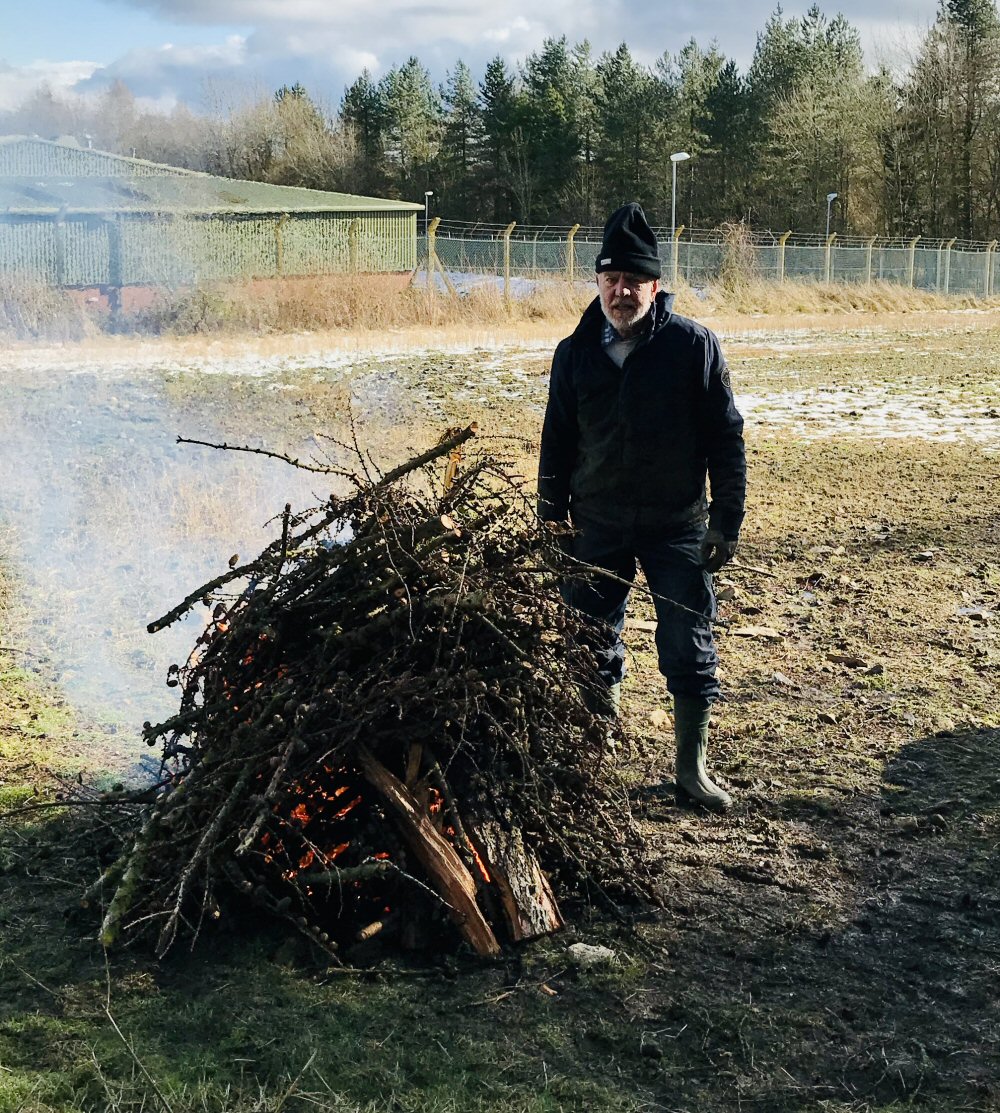
Loppers and hand saws were needed to remove all the side branches.

Added to the tree clearing the volunteers also checked and fed the ponies, fed the ducks and an owl box that had fallen was replaced. It will not be long before the owls will be looking for their nesting sites. Thank you to all the volunteers who worked hard throughout the day, your work is always appreciated.
Snow!
Monday, February 24th 2020
It was a shock to wake to a covering of snow. The Stone Circle and the moor, were almost black and white, with clouds scudding across the sky. Foxglove at its magical winter best!

In the Scrapes the sun did try to make an appearance.

Down on the lake the Mallard were being 'ice-breakers' or probably 'snow-breakers' as they swam through the covering of snow.

Scarlet Elfcup has been recorded on the Monthly Observation board for several weeks, in its usual places, but it is now being found in several different parts of the reserve. It was easy to see as a splash of red in amongst the snow.

Storm Damage
Sunday, February 23rd 2020
Foxglove has escaped the worst of the recent storms. A great deal of water swept through the becks and streams but thankfully did not do too much damage to dams and pipes.
We are taking regular photographs of the area of conifer trees that was felled last winter to record the changes. It is in this area that we recorded the first Primroses in flower.

This photograph was taken at the beginning of February.

Another taken today, and as can be seen, a conifer has been brought down by the strong winds.
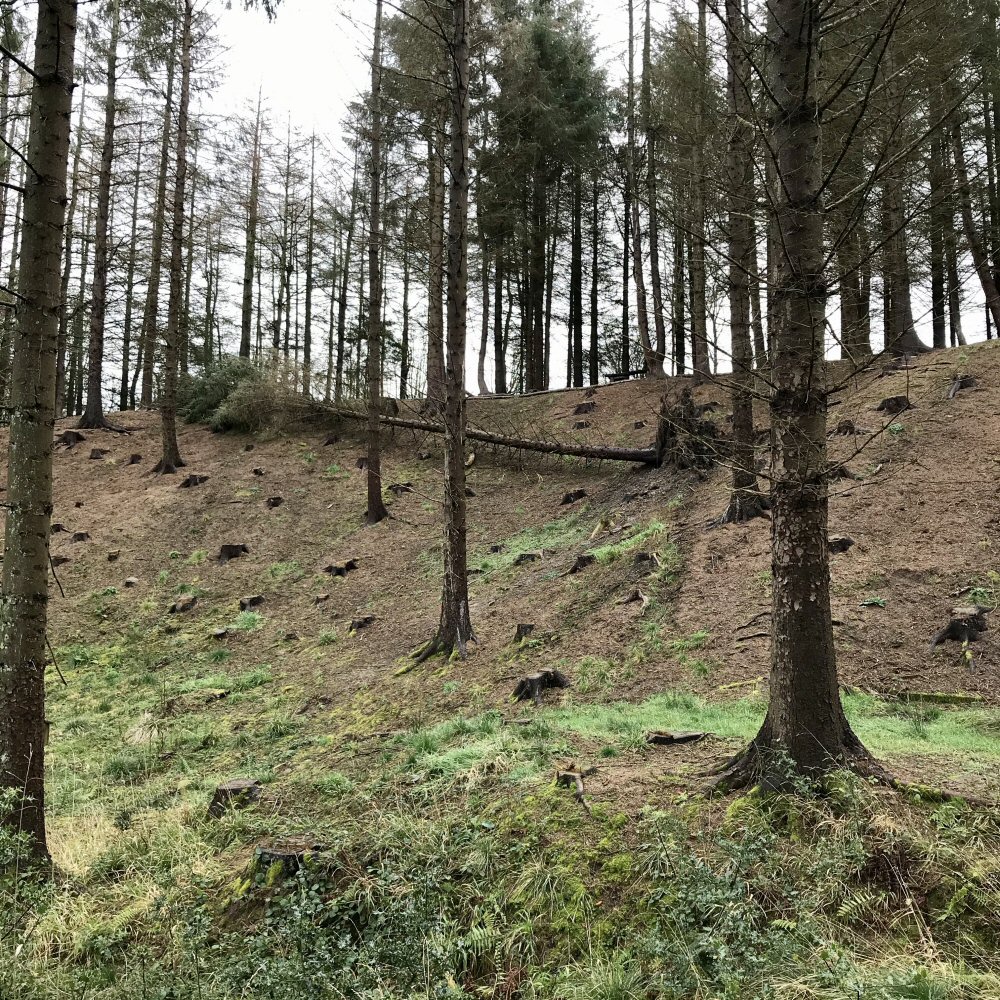
Near one of the newly profiled ponds along Risedale Beck another tree was found.

In 2018 a Pintail duck was sighted on the lake and it is nice to see that another, or the same one, has returned.
Bedraggled!
Thursday, February 20th 2020
Volunteers got a soaking on both worky days this week; it was cold with heavy rain showers but this didn't stop them from continuing the work in some of the important net rides.
A huge amount of Willow was cut. This will all grow back again very quickly and in a few months will look green and healthy again.
Some of the Willow stems were saved and made into toasting sticks for marshmallows and twister dough for the bonfire cookery event.
There has been plenty of work going on indoors too such as making new bird feeders, sanding and painting benches and inputting wildlife data.
The activity sheets in the classroom were also re-organised. These are suitable for all ages and are free to pick up from the classroom.
At least somebody was happy to be out in the pouring rain!
Bonfire Cookery
Wednesday, February 19th 2020
Several families enjoyed cooking on an open fire at Foxglove today as part of their half term activities. Luckily, the weather was kind and the rain held off all day long.
The day began with some serious measuring and mixing to get the different bread doughs to just the right consistency. There was a bit of trial and error involved as this kind of cooking isn't an exact science!

Next, apples and potatoes wrapped in foil were put into the ash pile from yesterday's fire where the net ride maintenance has been carried out by volunteers. They were carefully counted as they went in so that none would be missed when they were raked out again! There were fifteen potatoes or was it sixteen?!
a.jpg)
Some of the dough was put into an oiled frying pan.

The pan was then placed on the hot ash above the potatoes and apples to make delicious Bannock. This Scottish bread recipe makes a scone-like bread and according to tradition it must never be cut with a knife as this brings bad luck. Instead, it must be teared and shared! The group decided to add raisins to this batch which worked out well.

Twister dough was cooked on the end of freshly cut Willow, this bread requires a flame and two new small fires were made on an existing fire site using flint and steel.
No bonfire cookery event would be complete without a toasted marshmallow, which rounded off the session perfectly.
It was lovely to see the children so focused and enjoying the great outdoors.
a.jpg)
Thank you to all of the families who supported this event by turning out when rain was forecast and for sharing your photographs from the day.
a.jpg)
Thank you too to the volunteers who helped behind the scenes; preparing food, ensuring the ash pile was hot, manning the fires, ferrying items to and from the Field Centre and tidying up at the end.
Congratulations!
Monday, February 17th 2020
One of the members of the Swaledale Ringing Group has just gained a 'C' permit. Not that long ago Eleanor was the youngest ringer in the team as she was only fourteen years old when she first came to Foxglove to learn how to ring. Over that time she has enjoyed many varied ringing activities such as ringing water birds at Teesside.

Her skills as a canoeist came in handy closer to home when ringing Black-headed Gull chicks!
She has enjoyed plenty of exciting opportunities with the group from ringing Storm Petrels and Peregrines to owls and hundreds of passerines. She has always been prepared to get stuck in, not just with ringing but with some of the important habitat management too and in all weather conditions!

Here is a more recent picture!
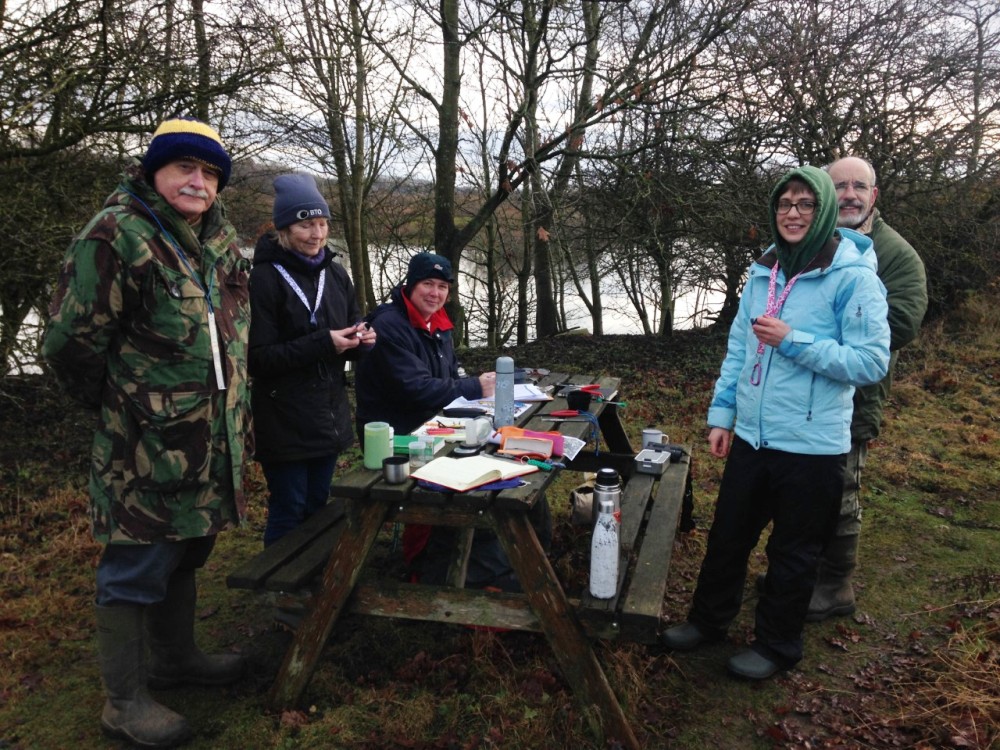
All ringers require a permit and start off with a trainee license. It usually takes at least a year to progress to a 'C' permit which allows you to work alone, but under the remote supervision of your trainer. Eleanor has taken her ringing a step further and is now studying a PhD in Fulmars and we wish her all the best for the future. Well done Eleanor and keep in touch!
Scarlet and Gold
Sunday, February 16th 2020
Whilst working in the net rides earlier in the week, some interesting flora and fungi were discovered. Scarlet elf cup (Sarcoscypha austriaca) was found popping up through the leaf litter. This brightly coloured fungi favours areas with high rainfall and can be seen on decaying sticks and branches especially in damp areas of the woodland floors. No wonder then that it is flourishing at Foxglove!
One of the first flowers to appear each year is Opposite-leaved Golden Saxifrage. The flowers have been described as forming 'trickles of gold' along riverbanks and streamsides in shady areas like wet woodlands.
Fortunately storm Dennis hasn't caused too much damage at the reserve, with the cascading ponds and dams all still in place. There will be some minor repairs to be done but nothing too serious. The wild weather over the weekend hasn't deterred many birdwatchers who have been delighted to see Crossbills, Redpolls, Bramblings and Siskins. Some were more successful than others. Lark and Taurus did not seem to be bothered by the stormy conditions and have been enjoying some extra rations to help keep them warm.
Net Ride Maintenance
Saturday, February 15th 2020
After storm Ciara came snow! This didn't deter the dedicated group of volunteers from coming in on Thursday to help with some much needed net ride maintenance. Over 60, 000 new birds have been ringed at Foxglove over the past 27 years and in order to carry out this important research for the BTO (British Trust for Ornithology) the mist net rides need to be managed. If the trees on either side of the ride are taller than the net then the birds tend to skip over the top of the net rather than landing in the nets and therfore reducing the amount of birds caught.
The vegetation is cut back regularly to head height and soon grows up again. Just like when you prune the bushes in your back garden. All of this pruning creates a huge amount of brash and as the net rides are inaccessible with a tracked shredder so a bonfire is the best way to cope with the prunings. Trying to light one in the snow with fresh green willow was a challenge but perserverance paid off and only cotton wool and flint and steel were used to start it! Thinner stems were cut with hand tools such as pruning saws and loppers.
As this job hadn't been done for a long time, some of the branches were too thick for hand tools and a small chainsaw was required.
There was a surprising amount of wood!
Slowly the snow turned to mud as the height of the surrounding trees was lowered significantly. Thank you to everyone who helped out including young people from Northdale Horticulture. The work isn't finished and will continue over the next few worky days.
It would be nice to think that it will be a bit drier next time however, with storm Dennis currently in full swing, this is highly unlikely!
Normal Silly!
Wednesday, February 12th 2020
Weather conditions were interesting yesterday morning for Team Tuesday! The recently planted hedge on the moorland edge had taken a battering from Storm Ciara over the weekend and the young trees needed to be re-staked and better protected with tree tubes. The moorland is the windiest place on the reserve and with several snow showers the only shelter was behind the Coxon Brothers digger!
It was decided that an attempt would be made at the work however, if conditions became 'really silly' then the group would retreat to the workshop instead! There was a lot of debate as to the definition of 'really silly' compared to 'normal silly' but spirits were high and Gerry kept himself warm with some exercises!
Fortunately, the showers were short lived and the team did a great job.
There is no such thing as bad weather just the wrong clothes; balaclavas, hats and hoods were the order of the day!
The two Exmoor ponies were checked and seemed to be in fine fettle. They are so well adapted to harsh weather with thick winter coats that their undersides remained dry in all of the heavy rain and snow. This can be seen in the picture below.
After lunch, the team split into smaller groups, some re-staking small trees that had been blown over…
...some planting Rowan trees and filling bird feeders. There were also many indoor jobs such as sanding and painting benches and chalk boards.
Thank you to all of the volunteers that turned out in such wintry conditions to help at the reserve. Besides Jo's delicious lemon cake there was another good reason to be thankful, the reedbed was cut last week just in time before the pond turned icy cold!
Storm Ciara
Sunday, February 9th 2020
Storm Ciara arrived at Foxglove. Yesterday the lake was lying calm, surrounded by winter colours, with blue sky and white clouds reflected on the surface.

Today was totally different. The brown flood waters were rushing over the whole of the weir. If you look closely you can see that the water had actually been high enough to come over the path.
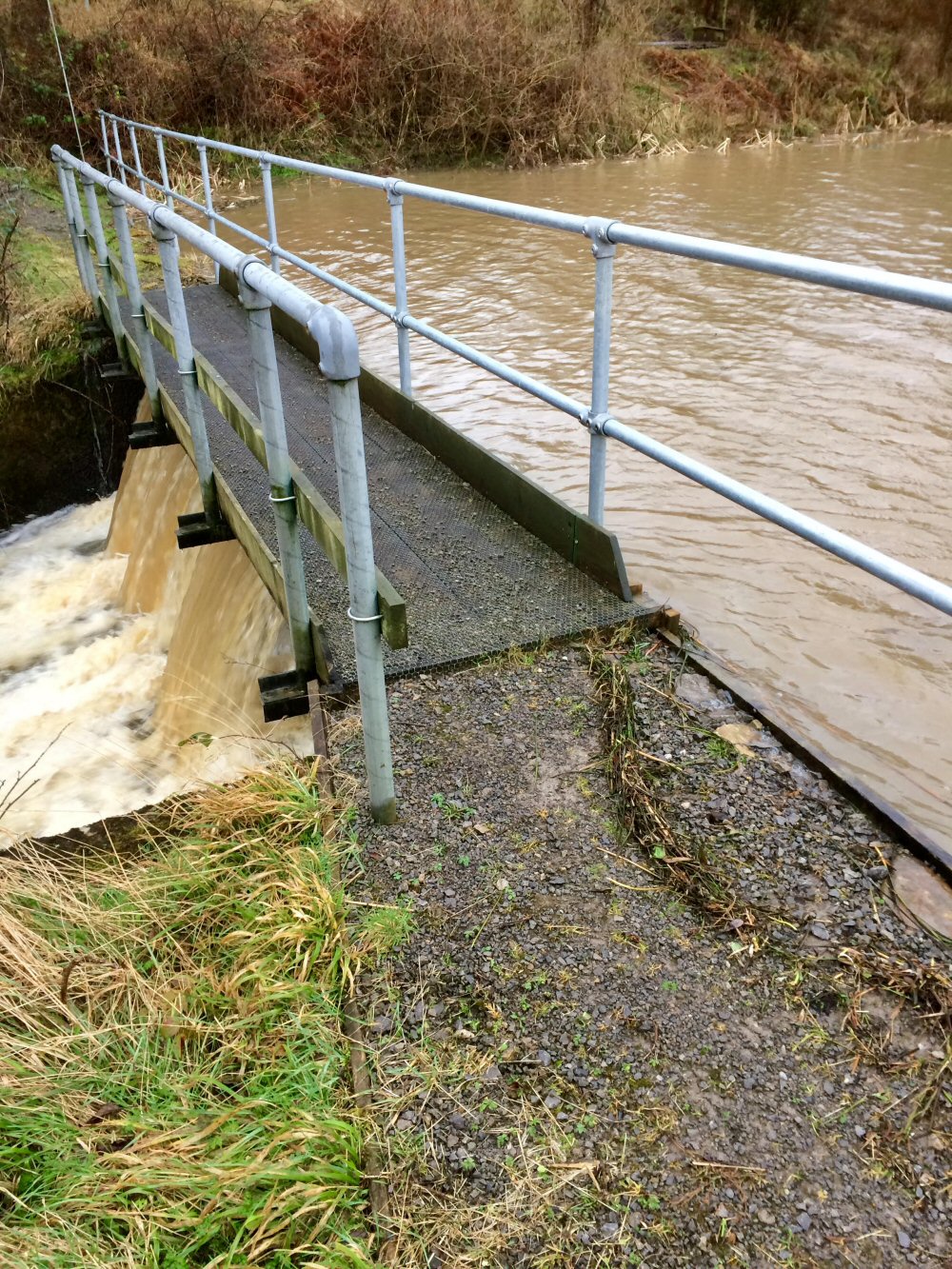
Saturday saw the cascading ponds gently 'cascading',

but today it was a totally different picture.
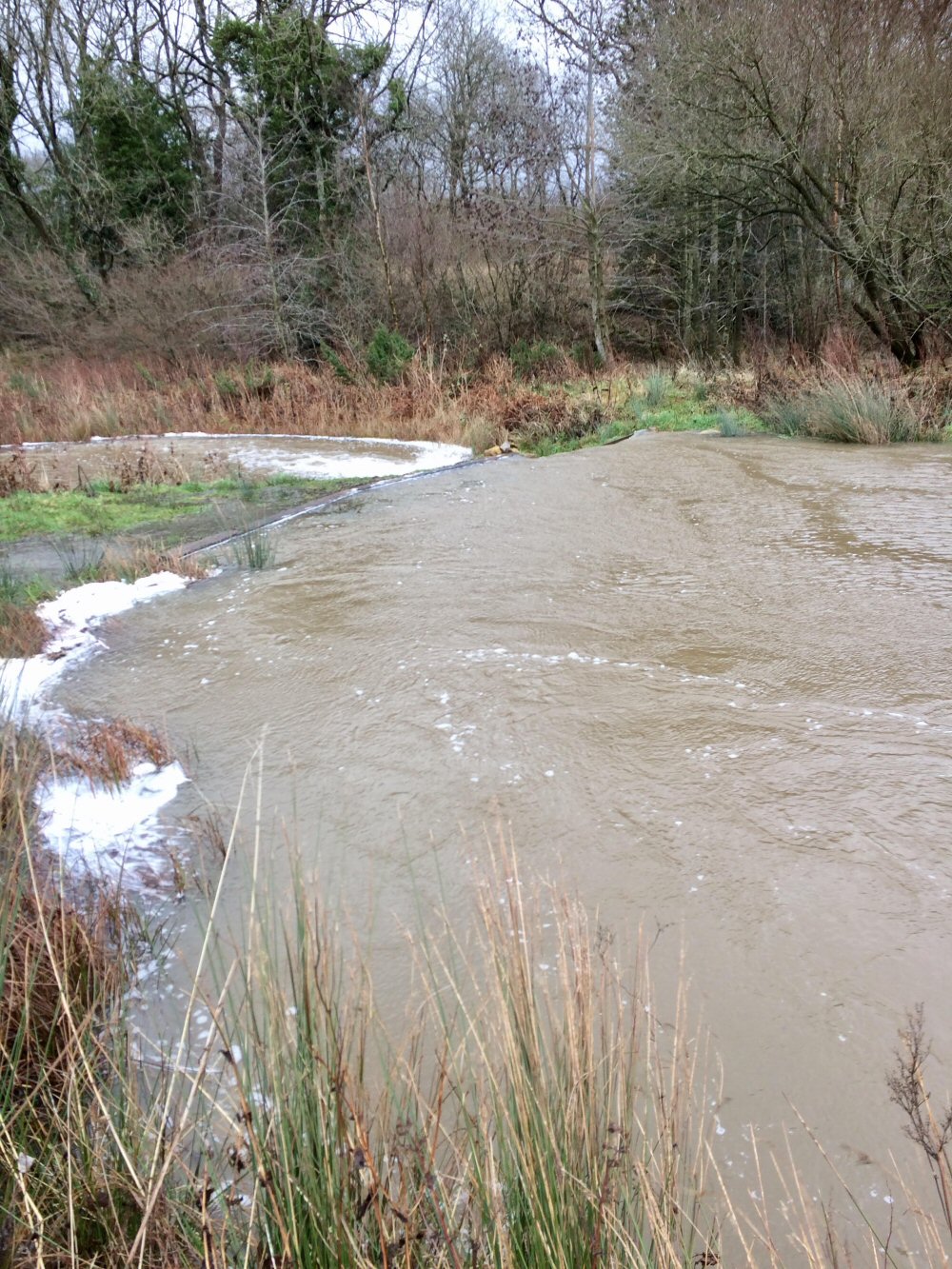
The ponds were certainly not quiet as the water thundered over the dams.

Reedbed Management
Thursday, February 6th 2020
One of the most beautiful and important habitats at the reserve is the reedbed in the Scrapes.
Over time reedbeds can gradually dry out through the build-up of silt, and develop into scrub and woodland. Traditionally, the tall stems were harvested in winter to be used for thatching, and this helped to set back the succession. There is only a small reedbed at Foxglove but in order to maintain it, it has to be cut once in a while to encourage new reed growth. The timing of this job is crucial; not too early in winter as birds use it to roost on cold winter nights and not too late because once it warms up the amphibians return to breed. Large reedbeds are cut using big machinery however, due to the small size and the inaccessability of this one, the only way is to do it with hedgecutters and strimmers and a lot of helpers. Therefore, this morning staff and volunteers donned wellies and waders and set to
You could soon see a big difference.
Hedgecutters were used in the deeper parts of the pond whilst a strimmer was used around the edges. Although there was a frosty start to the day, winter sunshine and blue skies made the mammoth task a pleasant one.
Long hay rakes were used to pull the cut reeds from the pond as if they were left they would rot and cause a lack of oxygen.
Piles and piles of stems were soon stacked onto the adjacent boardwalk.
These were then transported by wheelbarrow all the way back to the carpark (a few hundred metres away).
At the carpark they were loaded onto a trailer ready to be removed from the site.
By late morning, well over two thirds of the work had been completed.
After a quick scooby doo (brew), it was back to finish off the cutting and raking.
Once the cutting was complete, patches of open water were visible. The re-growth will be quick and by late summer this area will have greened up again. Only around a third of the total reedbed was cut to leave some tall reeds for the roosting birds. A different swathe will be harvested next winter.
The saying that 'many hands make light work' sprang to mind and none of this would have been possible without so many volunteers including young people from Northdale Horticulture.
The final touch was to clear the footpaths of debris with rakes, brushes and a leafblower.
Three cheers for the team that made it happen!
A Blackthorn Affair
Wednesday, February 5th 2020
Thinning out Blackthorn close to the entrance gate was the main task for Team Tuesday this week and what a fantastic job they did!
This part of the woodland had become completely overgrown with Blackthorn, so much so that birds were unable to fly through the trees anymore! The group of conservation volunteers set to with hand tools and in no time at all they uncovered beautiful old Willow trees and young Rowans that will now beable to thrive in the additional space. Here is the 'before' photo:
It took all day to clear a small section but work will continue today with students from Risedale Sports and Community College.
The 'after' picture shows the transformation:
Thank you to all of the volunteers and a special mention to Jo for making delicious date and walnut cake (well, some rules have to be broken) and to Emma for thinking of today's blog title!
A Wet and Windy Worky Day
Sunday, February 2nd 2020
The wild weather conditions didn't deter volunteers from turning out for the February Winter Worky Day yesterday.
The group worked close to the outdoor classroom to carry out woodland management. The task for the day was 'thinning' an area of native woodland. Thinning is the term foresters apply to removal of some trees from a stand to give others more room (and resources) to grow. It is important for the health of the remaining trees and in this case the ones left standing are the ones that will be of most benefit to the wildlife such as Rowan, Willow, Oak, Spindle, Scots Pine and Alder Buckthorn.

The cut trees (mainly Silver Birch) were processed and the wood was sorted into brash for the bonfire and useful wood to be kept. Some of the bigger logs will be made into bug hotels and bird feeders which are sold in the Field Centre.
The fire site was chosen carefully, on the opposite bank across a stream so that the scar will be out of sight from the footpath. It was also where Bracken had been growing.
There were some regular volunteers, some new faces and a familiar face as we welcomed back Carla, an intern from Teesside University.
Lunch was the traditional Foxglove curry served with all the trimmings; poppodums and naan bread! It was delicious!
Although it was wet and windy it was also mild enough to dine al fresco!
After lunch, it was mainly a case of clearing and tidying however, there were many times that the phrase “just one last tree” was heard! A human chain was formed to drag the last of the brash down and then up the steep bank to the fire.
With so many people to help, the work was completed sooner than anticipated and the day was finished with a guided walk to look at future plans for some of the other habitats.

Our sincere thanks to all who came to help and to Elizabeth for baking wonderful custard creams and angel whispers (these definitely don't count as cake!). The woodland will look beautiful in the summer with the additional light and space.






